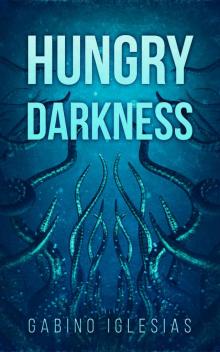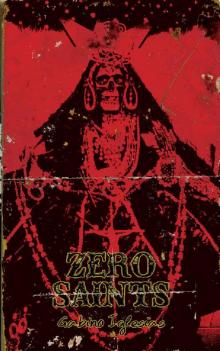- Home
- Gabino Iglesias
Both Sides Page 2
Both Sides Read online
Page 2
Gustavo can see Lala in his dreams. She’s in the background. She never says a word to him. Sometimes she leaves photographs behind. Photos of forests and ocean waves. Photos of coral reefs and starfish. Lala shows up when there’s water. She watches him as he travels through the geography and architecture of his subconscious. In some dreams, Lala carries his baby sister in her arms.
Alonso continues his vow of silence. He has yet to utter what he’s feeling or thinking to the ICE agents who have grown aware of their own mortality. He has listened for names and erased them from his mental list. The list has dwindled down to only three. Ricardo was confirmed dead by one of the agents who used to flirt with him. The agents talk amongst themselves, how they’re scared and feel helpless to this phenomenon. Alonso’s sense of time has warped. He’s apathetic to the concepts of life and death. Two months away from his family has made him lose weight. He can’t eat and he’s grown lethargic. He still dreams about his family. When they are together, there is always light. There are full meals. There is warmth. There is tenderness. It hurts Alonso to wake up in the tent day after day. He wishes the accumulation of his silence could convert into something other than small satisfaction that the agents are irritated with him for never speaking to them.
Lala kept a memento of that evening. She took a photograph of the pool where the girl died. As the girl was drowning, Lala was inside, cooking for a man who would leave her three months later to chase drug money going back and forth between the border. A high-pitched scream of terror came from the boy. He was shouting for help. Lala watched the way the man she loved followed her with his eyes, ensuring he was taken care of first. As soon as she served him his dinner, she washed her hands and went outside to investigate the commotion. Two tiny feet were sticking up from the hole of a floating yellow duck. The boy was curled in a ball, gasping for air and crying. Lala jumped into the pool and grabbed the girl. Her face was blue. No one else came to aid them. Lala called 911 and an ambulance took the girl and the boy without an adult because Lala was summoned back to the apartment to serve the man in her apartment another plate of food.
Esteban has dreamt of the backyard the entire week. This pushes his impulse to search through the shed in the back. He digs through piles of collected stamps and decks of cards. He digs until he finds old photographs stashed away in a neon pink duffle bag. He sifts through hundreds of photos belonging to unfamiliar faces. These photos are up close, sometimes blurred, some of them have dozens of floating orbs around their brow. Then, he finds a stack of photos with Lala crawling around tombstones, collecting pebbles and feathers. As he gets further into the pile, there are images of her digging up animal bones and photos of her wrapping fruit in yellow ribbon. There are photos of her burning gold paper. Another photo features people whose faces are painted gold with black cloaked robes. The photo underneath reveals them in a circle with a blood splattered offering in the middle of a yellow field. Esteban gasps at a picture of Lala with vials of blood in her hand.
Lala could feel out when someone’s luck was shifting. She caught people in the midst of crisis and sold them her money spells and protection spells out of her apartment after she was left to figure out financial stability on her own. She stopped being subservient to men who could not love at their full potential. She started a reciprocal business model. Every time her protection spells worked, she became bed-ridden. She needed something in return to balance out her bodily sacrifice. As she continued her craft, she understood how much power she could convert through magick. She made this deal: if her work changed someone’s life, they needed to live in ways which never harmed another soul. This was not only a stipulation for them, but for their family members as well. If any family member conducted cruel acts, they were cursed to become sick or even die. It was all dependent on the severity of the cruelty.
Gustavo shows up at Lala’s house again. This time, he has a sledgehammer. Esteban lets him in and gives into his search. He thinks the guy is after secret money or a biological revelation. Gustavo takes the sledgehammer and starts to bash into the backyard. Esteban tries to stop him at first, but he sees Gustavo crying. He digs out the broken chunks and Esteban helps him start digging. No more than four feet in, Gustavo starts digging with his hands. He’s weeping and frantic. Esteban cleans the mess they’ve made as Gustavo continues to throw dirt out of the miniature crater they’ve forged. Gustavo finds the remains of a small body and looks up at Esteban. Esteban shakes his head and mouths oh-my-god.
“Lala told me guilt manifests in interesting ways.”
Gustavo runs to grab a small coffin from his car and places the bones inside, one by one, kissing and whispering to each piece.
Alonso pretends he’s in purgatory. The adults around him are cold. As they’ve gotten more accustomed to their jobs, they get sloppy. They get cruel. Mean. Sometimes, the boys are stuck inside the tent all day. There are days where their trays of food are delivered to the front door. Someone knocks and the boys pass the trays around, making sure to ration any shortages so everyone can eat.
Alonso dreams about his father. On the beach, they run beside each other and chase waves. Sometimes, Emiterio shows up as a coyote puppy. Alonso holds onto the puppy with all of his strength. The puppy responds with face licks and then pounces around the desert dirt as soon as Alonso lets him loose. They howl together.
Eleven of the deaths were consequences of Lala’s binding contract. The other hundreds remain unexplained. Alonso can’t remember the names in the letters anymore. He tries to go through his mental scroll and nothing happens. He keeps this secret until it all seems like a blurred memory. He dreams of his family often and waits for Emiterio every single day.
Eventually, Emiterio will find him, but not while Alonso’s still a child.
Los Ostros Coyotes
Daniel A. Olivas
“Espero que la salida sea alegre,
y espero no volver nunca más.” — Frida Kahlo
Nadie construye muros mejor que yo, créeme.
The guard gently led Rogelio out of the lookout room. The boy shook his head so hard that tears flew from his eyelashes hitting the guard’s green uniform making dark, petaled blotches on the thick fabric. Rogelio tried to shake from his mind the image of his huddled, sobbing parents. But he couldn’t. And though he was only in fifth grade, Rogelio was smart enough to know that he’d never be able to wipe away the memory of waving goodbye to his parents through the cloudy, bulletproof Plexiglas.
The President’s executive order explicitly laid out the design of the detention centers connected to the Great Wall, and explicitly prohibited the expenditure of funds for more humane farewells. Children who belonged in the United States—because they were born in the country or were otherwise naturalized—could have no more than thirty seconds to gaze upon their soon-to-be deported parents through the Plexiglas. Because the President prohibited the installation of microphones and speakers, the goodbyes would consist of silent, tearful pantomimes and mouthed expressions of love and promises to behave and never forget.
Soon Rogelio and his older sister, Marisol, would be packing their meager belongings and sent to live with their tía Isabel in Los Angeles. And his parents would be with the other sobbing parents on a large, black bus that will take them through one of the reinforced gates in the Great Wall and back to Mexico regardless of which Latin-American country they called home. The grieving parents would disembark in Tijuana and be left to fend for themselves. The President had designed this process, praising himself for coming up with such a clean, fast, and beautiful way of MAKING AMERICA GREAT AGAIN! He had Tweeted: “Only a Very Stable Genius could come up with this very GREAT system! And Mexico will someday PAY for my Great Wall!”
The guard led Rogelio past the other children who waited in two snaking lines—one for boys, the other for girls, as the President had decreed—along the walkway toward the nurse’s office for a quick visit before going back to the barracks to pack. Above the
cries, shouts, and laughter of the other children, Rogelio could hear the recurring audio loop of the President’s voice blaring over the intercoms that spotted the ceiling: “I will build a great wall—and nobody builds walls better than me, believe me—and I’ll build them very inexpensively. I will build a great, great wall on our southern border, and I will make Mexico pay for that wall. Mark my words.” Rogelio’s teacher, Ms. Becerra, had noted in class one day that Mexico had yet to pay for the President’s wall, which cost more than $21 billion to build.
As he walked with the guard, Rogelio blinked away the last of his tears and looked out the large, floor-to-ceiling windows that allowed perfect views of the Great Wall. Enormous spotlights were trained on it in intervals that also lit up the cool San Diego evening. Rogelio thought that the wall was a dreadful, hideous thing even though the President had paid “good money, the best money” to one of his most supportive Twitter followers—a contractor from Alabama—to design the outlandish, golden curlicues that were painted along the wall’s top and bottom edges. Between the borders of gold paint, the President wanted to share with people on either side of the Great Wall his life’s accomplishments as depicted in bas-relief, captioned scenes beginning from his childhood (I was the BEST son!), his education (Only the GREATEST schools and TOP grades!), beginning careers in business and television (I had the HIGHEST ratings!), running for president (Biggest victory EVER!), the swearing in (So Presidential!), and the President signing executive orders (Making America Great Again!).
The President saw on Twitter that the bas-relief scenes on the Mexican side of the Great Wall had been defaced in obscene ways, but his staff convinced him that photographs of the defacement were nothing more than fake news designed to embarrass him. And this attack on his greatest accomplishment simply confirmed in the President’s mind that he was justified in imposing martial law and suspending the 2020 election four years ago. The President had seen numerous pre-election polls that showed him losing the general election in a landslide he blamed—in an early morning tweet—on the “Lying Liberal Media, Fake Polls, and Chinese Interference!” He had no choice but to call off the election and order the military to keep “the peace.” In a rambling, hour-long, primetime address to the world on October 15, 2020, the President had promised that once a full, televised Senate investigation into traitorous activities could be completed, he would lift martial law and only then could free, fair elections resume. He was true to his word: Most evenings during the last four years, the Senate held hearings that were broadcast on Fox, the only television network with a federal license to disseminate news, where witness upon witness divulged in exquisite detail the plots against the President and America. The hearings would take another two or three years, said the President, but they would eventually come to an end, and a full, unredacted report would be released. This is what the President promised, and who but only the nastiest traitor could question his sincerity?
The guard brought Rogelio to another line, this one in front of the nurse’s office. Unlike the lines to say goodbye to their parents, there was only one line here, where boys and girls could mix and talk. The guard gently touched Rogelio’s shoulder and said: “Wait here until it’s your turn.” The boy nodded, and the guard turned on his heel and went back to the lookout room to fetch the next child.
Rogelio looked at the nurse’s office. A sobbing girl came out, rubbing her right forearm. Another guard was waiting for her, and slowly guided her toward the girls’ barracks. Rogelio sighed. He hated shots, and he figured the children were forced to receive some kind of booster inoculation. Rogelio liked that word: inoculation. He let it roll around in his mind. He learned from his teacher that all words had origins—roots—in other languages. French. German. Latin. Where did “inoculation” come from? And what about the very first words? How could those words have any roots if nothing existed before?
Rogelio’s turn finally came. A guard opened the door for the boy and said, “Go in.” Rogelio complied, stepped into the darkened room that was lit by a lone lamp over phlebotomy chair. The moment the guard closed the door with a loud click, the President’s audio loop about the Great Wall disappeared, and the room was enveloped in the most beautiful song Rogelio had ever heard. The two women’s voices sang in a language he did not understand, and seemed to come from every corner of the dark room.
The nurse stood to the left of the chair and swiped at an iPad. The nurse reminded Rogelio of his cousin Mateo who lived in Los Angeles, the only son of his tía Isabel, except the nurse had blond hair and a neatly trimmed beard. The nurse suddenly stopped swiping and looked up at the boy.
“Beautiful, isn’t it?” said the nurse.
The boy nodded.
“It’s called The Flower Duet.”
The boy nodded again, feeling calm for the first time since Homeland Security had rounded up his family in their home in Chula Vista two weeks ago.
“It’s from an opera called Lakmé written a long time ago.”
The boy listened.
“Here, this part, it’s so beautiful, when the two voices play off each other.”
The boy nodded.
The nurse sighed, then looked back at the iPad. “Rogelio Acosta?” He pronounced “Rogelio” as “roe-JELLO-o.”
Rogelio had heard his name mangled too often to even notice. He nodded.
“Show me your dog tag.”
Rogelio pulled the tag out from the top of his T-shirt and showed it to the nurse. The nurse bent forward, squinted, nodded, and then typed something onto the iPad.
“Please sit.”
The boy went to the phlebotomy chair. It was a green, padded contraption that had seen far too many children. The right arm of the chair that was set in the down position was cracked and revealed white stuffing, and the seat betrayed the many bottoms that had nestled uncomfortably waiting to be poked. The left arm of the chair was propped in the upright position, which allowed Rogelio to slide in.
“I’m getting a shot?” said the boy as he settled in. He tried to sound brave, but his voice cracked, something that was happening more often. He then tried to impress the nurse: “An inoculation?”
The nurse let out a muffled laugh that ended in a sloppy snort.
“I guess you can call it that,” the nurse said as he grabbed what looked like a long fireplace lighter from a table that stood in the shadows behind him. “It’ll feel like a shot.” He used the other hand to grab a bit of cotton. The strong smell of alcohol suddenly hit Rogelio’s nostrils.
“Put your arm down, keep still,” said the nurse. Rogelio complied. The nurse quickly swabbed the boy’s forearm. The boy’s entire body tensed.
“Look up at the corner,” said the nurse with a nod of his head to a spot above and to the left of Rogelio’s head. “It’s better not to look. It’ll be over fast.”
Rogelio turned his head and looked up to the dark corner of the room, just to the left of the door he had entered. The music seemed to grow louder, and the women spoke to him in a mysterious language he was on the verge of understanding. The corner’s darkness filled his eyes, and the music removed all thought from the boy’s mind. Rogelio felt the nurse grab his wrist, he heard a click, felt a small pinch on his forearm, and it was over.
“Good job,” said the nurse. “We’re done here. Just let me put a bit of cotton and tape on because it will bleed a little for the next couple of hours.”
The nurse worked fast. A few seconds later, Rogelio looked down at his forearm where the nurse had expertly wrapped a wad of cotton with blue, stretchy tape.
“Easy-peasy,” said the nurse. “You can go now.”
Rogelio stood. The women’s voices reached an apex of beauty. He couldn’t move.
The nurse smiled. “Stunning, isn’t it?”
The boy nodded.
“Almost as if God is singing.”
Rogelio nodded. “What are they saying?” he whispered.
The nurse shrug
ged. “Beats me. But does it really matter?”
Before Rogelio could answer, the music ended, and a sharp rap on the door shook the two out of their mutual reverie. The door opened, the President’s audio loop invaded the room (“…nobody builds walls better than me, believe me…”), and a different guard stuck her head into the room. A teenage girl stood silently near the guard waiting for permission to enter.
“Time to go,” said the nurse.
The boy nodded and slowly walked to the door.
A mí la muerte me pela los dientes.
The large, black bus rocked back and forth on the I-5 freeway toward Los Angeles. An hour earlier, it had made its way from the six-level parking structure at the base of the Great Wall to the freeway entrance. Rogelio rested his head on Marisol’s shoulder. His sister snored softly. He felt safe with her. The forty-two children on the bus made little noise, save for exhausted snores, muffled sobs, terrified whispers. The bus driver had turned off the interior lights just before backing out of the parking structure explaining through the intercom system that it could take several hours to drive to Los Angeles and “deposit” the children at their designated new homes. She’d said that the children should enjoy the box of snacks that had been set on each seat containing bottled water, a bag of pretzels, an apple, a wrapped mint. Not much, but their new families would feed them, she was sure of that. In the meantime, enjoy this free and very excellent nourishment courtesy of the President, and then try to get some shuteye. Most of the children had quickly made their way through the snacks. With the lights turned off, few could fend off the brutal fatigue that encased them in the aftermath of the farewells with their parents.

 Both Sides
Both Sides Hungry Darkness: A Deep Sea Thriller
Hungry Darkness: A Deep Sea Thriller Gutmouth
Gutmouth Zero Saints
Zero Saints